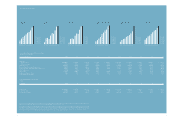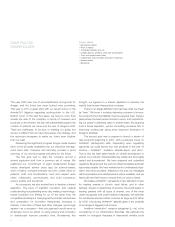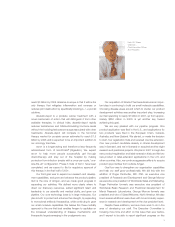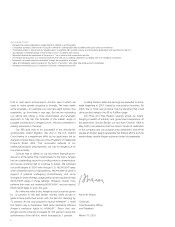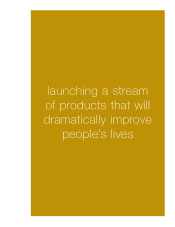Amgen 2000 Annual Report Download - page 14
Download and view the complete annual report
Please find page 14 of the 2000 Amgen annual report below. You can navigate through the pages in the report by either clicking on the pages listed below, or by using the keyword search tool below to find specific information within the annual report.
16
CANCER
NEUPOGEN® (Filgrastim)
Chemotherapy Patients
Neutropenia
Each year, more than 1 million people are diagnosed with
cancer in the United States alone. Since 1991, Amgen’s
NEUPOGEN®has helped patients with cancer undergoing
myelosuppressive chemotherapy battle one of the treatment’s
serious possible side effects—a reduction in white blood cells
called neutrophils. Neutropenia —the resulting condition—can
lead to infection and to delays in chemotherapy delivery. In the
past year, Amgen made significant progress with three addi-
tional product candidates that may lessen some of the serious
side effects associated with chemotherapy treatment.
Pivotal clinical trials of SD/01 were completed in women
with breast cancer. This innovative product candidate is a sus-
tained duration form of NEUPOGEN®. If approved by regulatory
agencies, SD/01 may benefit patients by permitting less-
frequent dosing than the current daily dosing of NEUPOGEN®.
SD/01 may be effective given as infrequently as once per cycle
of myelosuppressive chemotherapy. Chemotherapy cycles are
often scheduled every three to four weeks. As a result, patients
may benefit from protection from infections, as manifested by
fever and neutropenia.
ARANESP™(darbepoetin alfa), in addition to its potential
use in kidney disease treatment, is being evaluated for treat-
ment of cancer-related anemia. Many patients with cancer
suffer from anemia. This anemia may be caused by the cancer
itself or may be a side effect of chemotherapy. Phase 2 clinical
trials suggest that treatment with ARANESP™of patients with
cancer-related anemia may be effective given once weekly or
once every three weeks.
Cancer treatments such as chemotherapy and radio-
therapy are also often toxic to the mucosal cells lining the
mouth and the gastrointestinal tract, resulting in ulceration of
the mucosal lining—mucositis. This condition results in painful
sores in the mouth and along the length of the gastrointestinal
tract that may prevent patients from eating. Patients frequently
require pain medication and have reduced quality of life.
Another of Amgen’s product candidates, keratinocyte growth
factor (KGF), is a recombinant form of a naturally-occurring
growth factor that stimulates the development of mucosal
cells. Early clinical trials suggest KGF may offer benefit for
patients who experience mucositis following chemotherapy
and radiotherapy.
Amgen is now broadening its cancer franchise to include
the discovery and development of novel cancer therapeutics to
target and eradicate tumor cells.
Abarelix-depot, the first long-acting gonadotrophin-
releasing hormone antagonist, is a potential cancer therapeutic
that Amgen licensed from Praecis Pharmaceuticals in 1999.
Researchers from Amgen and Praecis are collaborating on the
development of abarelix-depot to treat men with prostate
cancer, aiming to limit cancer cell stimulation by lowering
testosterone levels. Abarelix-depot is currently under regula-
tory review for the treatment of patients with prostate cancer
and also is being studied in women with endometriosis, a
commonly occurring, painful, and potentially debilitating pelvic
disorder affecting women of childbearing age.
In the past year, Amgen licensed a novel cancer therapeu-
tic antibody, epratuzumab, from Immunomedics. Epratuzumab
is currently being evaluated for its ability to treat indolent (low
grade) and aggressive non-Hodgkin’s lymphoma (NHL). In NHL,
cells in the lymphatic system become abnormal. NHL can start
in any of the many parts of the body where there is lymphatic
tissue and spread to almost any part of the body.
These efforts illustrate Amgen’s continued dedication to
improving the lives of patients with cancer.
16


